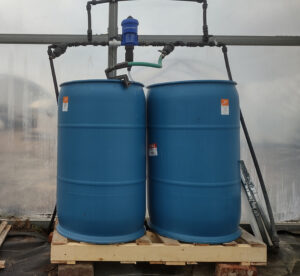Project Overview
Commodities
- Vegetables: tomatoes
Practices
- Animal Production: inoculants
- Crop Production: biological inoculants, high tunnels or hoop houses
- Soil Management: soil analysis
Summary:
We will be looking at how the yield of high tunnel tomatoes are affected by the use of a farm-made indigenous soil microbial inoculant similar to Korean Natural Farming methods, but simpler and cheaper to implement using locally sourced ingredients. Improving soil health in high tunnels is an on-going struggle for many. The “desert effect” from lack of rainfall in tunnels, combined with frequent tillage, can lead to the destruction of microbial diversity. Many methods of replenishing these beneficial bacteria and fungi can be expensive (purchased inoculants), tie up valuable farm real estate (covercropping), or be laborious (vermicomposting, etc.). By producing our own farm-made microbial inoculant, we hope to increase the soil’s microbial community (ecologically sound), increase yields & decrease costs (economically viable), and save the farmers’ time through this simple system (socially responsible).
Four ingredients: potatoes, leaf mold, salt, & water. ‘Wild caught’ soil microbes from leaf mold proliferate by feeding on a dextrose nutrient media (potato water). In this system, most ingredients would be available on-farm (potatoes & leaf mold). The only ingredient to purchase-in would be salt, which is easily accessible. If potatoes aren’t grown on-farm, they are cheaply accessible from any supermarket.
FINAL REPORT - Project Summary
Explanation of Problem & Solution (why & what)
High tunnels often have degraded soil health with low microbial life due to lack of rainfall and over tillage. In our project, we looked at the potential soil health benefits of using a farm-made microbial inoculant and its effect on the yields of high tunnel grown tomatoes. The inoculant recipe, called JADAM Microbial Solution (JMS), comes from the JADAM system of natural farming, which is an off-shoot of the Korean Natural Farming (KNF). It consists of anaerobically fermenting four ingredients: water, salt, cooked potatoes, and a good quality compost, and applying it diluted 1:20 to the soil.
Research & Educational Approach (how & with whom)
In Year 1, we built and tested the inoculant brewing station.
[caption id="attachment_1061181" align="alignnone" width="300"] Inoculant brewing station components: 55 gallon barrels, Dosatron fertilizer injector, tubing and fittings, filter, Hudson valve, and mesh "bioextractor" bag.[/caption]
Inoculant brewing station components: 55 gallon barrels, Dosatron fertilizer injector, tubing and fittings, filter, Hudson valve, and mesh "bioextractor" bag.[/caption]
In Year 2, we ran our experiment. We made weekly batches of JMS and applied through drip tape to three successions of tomatoes. In each succession, we had an experimental row that received JMS and a control row that was irrigated separately. We recorded the harvest yield numbers from each row for all three successions to determine yield difference.
At the end of Year 2, we held a field day for a local farming group with a discussion of the project and its results, as well as a farm tour. 25+ people joined us to learn about the project.
Project objectives:
- Develop a simple, affordable system for making and applying farm-made microbial inoculants within high tunnel-grown tomato production (Year 1)
- Determine the effect of farm-made microbial inoculant on overall yield of tomatoes through multiple successions over the course of a full season (Year 2)
- Share findings through field days and social media (Year 2)